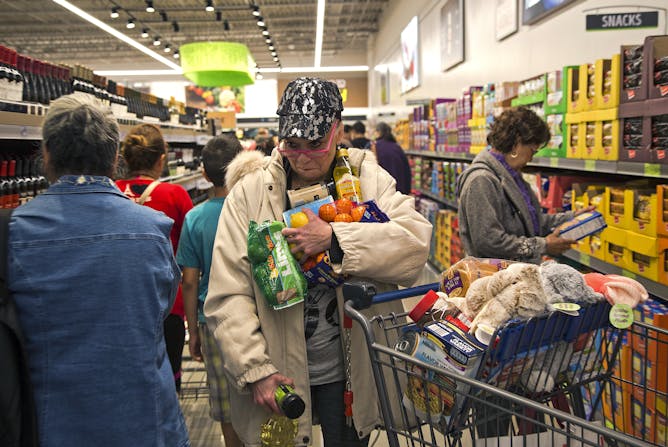|
As a result of not being a terrible cook, my family and I tend to eat at home more often than not – and certainly more often than fellow New Yorkers who use their ovens for storage. But there is a downside to this: Grocery costs have hiked faster than restaurant bills, and as such, the proportion of income I pay on food has probably gone up more than those who eat out. That said, I don’t drive to restaurants, so I haven’t been hit by rising gas prices.
The point is, inflation isn’t the same for everyone – different households have different spending habits. Now I don’t know if economist Jacob Orchard can cook or drive, but I do know he is a clever sort who has a snazzy tool that works out the rate of inflation for different income groups. He found that while inflation is high for everyone, it is America’s poorest households who are seeing their spending costs go north at a quicker rate. And the rising cost of gas and groceries is further fueling the inflation gap between rich and poor.
Also today:
|

Jacob Orchard, University of California San Diego
The rising cost of groceries and gas is fueling the fastest increase in consumer prices in 40 years and widening the inflation gap between the rich and poor.
|
Economy + Business
|
-
Atinuke Adediran, Fordham University
The lack of racial and ethnic diversity among nonprofit leaders could make it hard for their organizations to achieve their goals.
|
|
Arts + Culture
|
-
Amit Kumar, University of Texas at Austin; Michael Kardas, Northwestern University; Nicholas Epley, University of Chicago
A series of experiments explored the seemingly radical idea that opening up to strangers can be deeply satisfying.
|
|
Science + Technology
|
-
Luke O'Neill, Trinity College Dublin
Omicron may be able to dodge antibodies, but it is no match for our killer T-cells.
|
|
Ethics + Religion
|
-
Anthony Siracusa, University of Colorado Boulder
MLK’s vision for nonviolence included abolishing what he called triple evils – racism, poverty and militarism.
-
Molly Jackson, The Conversation
Five articles on the meanings of hope and how to think about resilience, healing and even joy in the midst of this winter’s bleakness.
|
|
Environment + Energy
|
-
Moon-Ho Jung, University of Washington
Sugar has deep links with slavery in the US, but Black workers weren’t the only ones affected. In post-Civil War Louisiana, Chinese workers also toiled cutting and processing cane.
|
|
Education
|
-
Marcela G. Cuellar, University of California, Davis; Alicia Bencomo Garcia, University of California, Davis; Kem Saichaie, University of California, Davis
Students who are the first in their family to attend college view a college degree differently than children of college-educated parents, researchers find.
|
|